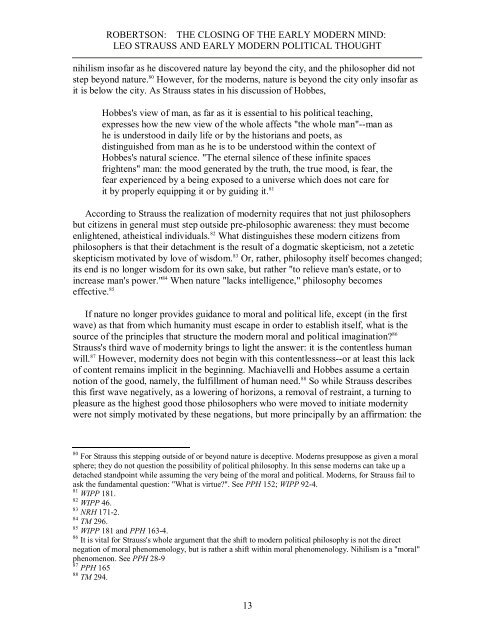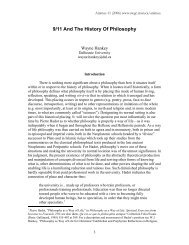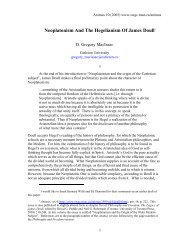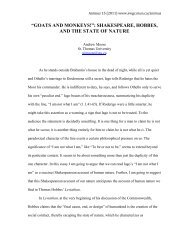Leo Strauss And Early Modern Political Thought
Leo Strauss And Early Modern Political Thought
Leo Strauss And Early Modern Political Thought
Create successful ePaper yourself
Turn your PDF publications into a flip-book with our unique Google optimized e-Paper software.
ROBERTSON: THE CLOSING OF THE EARLY MODERN MIND:LEO STRAUSS AND EARLY MODERN POLITICAL THOUGHTnihilism insofar as he discovered nature lay beyond the city, and the philosopher did notstep beyond nature. 80 However, for the moderns, nature is beyond the city only insofar asit is below the city. As <strong>Strauss</strong> states in his discussion of Hobbes,Hobbes's view of man, as far as it is essential to his political teaching,expresses how the new view of the whole affects "the whole man"--man ashe is understood in daily life or by the historians and poets, asdistinguished from man as he is to be understood within the context ofHobbes's natural science. "The eternal silence of these infinite spacesfrightens" man: the mood generated by the truth, the true mood, is fear, thefear experienced by a being exposed to a universe which does not care forit by properly equipping it or by guiding it. 81According to <strong>Strauss</strong> the realization of modernity requires that not just philosophersbut citizens in general must step outside pre-philosophic awareness: they must becomeenlightened, atheistical individuals. 82 What distinguishes these modern citizens fromphilosophers is that their detachment is the result of a dogmatic skepticism, not a zeteticskepticism motivated by love of wisdom. 83 Or, rather, philosophy itself becomes changed;its end is no longer wisdom for its own sake, but rather "to relieve man's estate, or toincrease man's power." 84 When nature "lacks intelligence," philosophy becomeseffective. 85If nature no longer provides guidance to moral and political life, except (in the firstwave) as that from which humanity must escape in order to establish itself, what is thesource of the principles that structure the modern moral and political imagination? 86<strong>Strauss</strong>'s third wave of modernity brings to light the answer: it is the contentless humanwill. 87 However, modernity does not begin with this contentlessness--or at least this lackof content remains implicit in the beginning. Machiavelli and Hobbes assume a certainnotion of the good, namely, the fulfillment of human need. 88 So while <strong>Strauss</strong> describesthis first wave negatively, as a lowering of horizons, a removal of restraint, a turning topleasure as the highest good those philosophers who were moved to initiate modernitywere not simply motivated by these negations, but more principally by an affirmation: the80 For <strong>Strauss</strong> this stepping outside of or beyond nature is deceptive. <strong>Modern</strong>s presuppose as given a moralsphere; they do not question the possibility of political philosophy. In this sense moderns can take up adetached standpoint while assuming the very being of the moral and political. <strong>Modern</strong>s, for <strong>Strauss</strong> fail toask the fundamental question: "What is virtue?". See PPH 152; WIPP 92-4.81 WIPP 181.82 WIPP 46.83 NRH 171-2.84 TM 296.85 WIPP 181 and PPH 163-4.86 It is vital for <strong>Strauss</strong>'s whole argument that the shift to modern political philosophy is not the directnegation of moral phenomenology, but is rather a shift within moral phenomenology. Nihilism is a "moral"phenomenon. See PPH 28-987 PPH 16588 TM 294.13
















